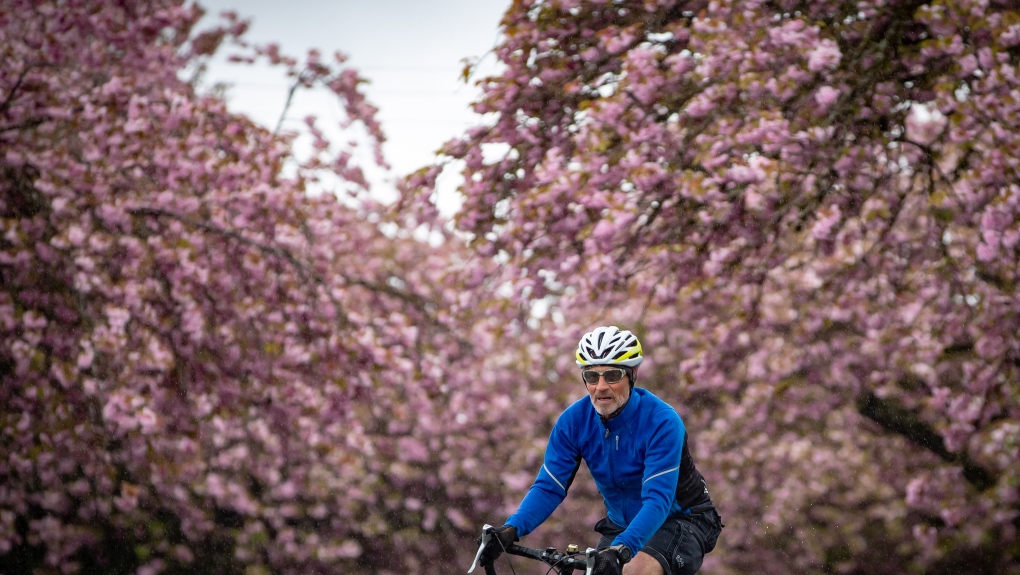When do cherry blossoms bloom? B.C. contest aims to predict the peak
 A cyclist rides past cherry blossoms in Vancouver, on Sunday, April 25, 2021. THE CANADIAN PRESS/Darryl Dyck
A cyclist rides past cherry blossoms in Vancouver, on Sunday, April 25, 2021. THE CANADIAN PRESS/Darryl Dyck
A contest organized by a B.C. university that aimed to predict peak bloom of the beloved cherry blossom drew dozens of participants from four continents.
Elizabeth Wolkovich, associate professor of forest and conservation sciences at the University of British Columbia, said she and her colleagues had the idea to get the public involved in figuring out when the short-lived seasonal favourites bloom.
"Cherry blossoms are an early spring species, they change a lot with warming and recently we've noticed that we're having trouble accurately monitoring the change," Wolkovich told CTV News Vancouver.
"With climate change we know that most temperate plants, especially in the northern hemisphere are advancing their leaf out and their flowering with warming. Some plants have advanced two or three weeks."
The contest looked at cherry blossoms in Vancouver; Washington, D.C.; Kyoto, Japan; and Liestal-Weideli, Switzerland. Eighty-one participants signed up, forming 41 teams.
"We have only so many ideas and concepts amongst us and so we thought if we could get the public and lots of additional researchers, citizens out there monitoring change, we might be much better able to understand what's going on with cherry blossoms and better predict them in the future," Wolkovich said.
Wolkovich explained cherry blossoms, like other temperate, woody plants, require cold in the winter followed by enough spring warmth to trigger flowering. She said some contestants used this classic biological pattern to make their predictions, while others used artificial intelligence like machine learning for theirs.
Results from the contest will be released in May. Wolkovich said the average predicted peak bloom date for Vancouver and Liestal-Weideli is April 2. In Kyoto, the average predication is April 3 and for Washington, D.C., it's April 1.
"This is absolutely critical for us," Wolkovich said. "How long the growing season is, how early these cherry blossoms start, is indicative of how lots of other early trees leaf out and that in turn determines how much carbon our forests take up and so ultimately this could inform and improve predictions of climate change."
The contest is expected to run again ahead of next spring.
CTVNews.ca Top Stories

BREAKING Iran fires air defence batteries in provinces as explosions heard near Isfahan
Iran fired air defence batteries early Friday morning as explosions could be heard near a major air base near Isfahan, raising fears of a possible Israeli strike following Tehran's unprecedented drone-and-missile assault on the country.
American millionaire Jonathan Lehrer denied bail after being charged with killing Canadian couple
American millionaire Jonathan Lehrer, one of two men charged in the killings of a Canadian couple in Dominica, has been denied bail.
Nearly half of China's major cities are sinking, researchers say
Nearly half of China's major cities are suffering 'moderate to severe' levels of subsidence, putting millions at risk of flooding especially as sea levels rise.
Prince Harry formally confirms he is now a U.S. resident
Prince Harry, the son of King Charles III and fifth in line to the British throne, has formally confirmed he is now a U.S. resident.
Judge says 'no evidence fully supports' murder case against Umar Zameer as jury starts deliberations
The judge presiding over the trial of a man accused of fatally running over a Toronto police officer is telling jurors the possible verdicts they may reach based on the evidence in the case.
Health Canada to change sperm donor screening rules for men who have sex with men
Health Canada will change its longstanding policy restricting gay and bisexual men from donating to sperm banks in Canada, CTV News has learned. The federal health agency has adopted a revised directive removing the ban on gay, bisexual and other men who have sex with men, effective May 8.
Colin Jost names one celebrity who is great at hosting 'Saturday Night Live'
Colin Jost, who co-anchors Saturday Night Live's 'Weekend Update,' revealed who he thinks is one of the best hosts on the show.
Sports columnist apologizes for 'oafish' comments directed at Caitlin Clark. The controversy isn't over
A male columnist has apologized for a cringeworthy moment during former University of Iowa superstar and college basketball's highest scorer Caitlin Clark's first news conference as an Indiana Fever player.
'Shopaholic' author Sophie Kinsella reveals brain cancer diagnosis
Sophie Kinsella, the best-selling author behind the 'Shopaholic' book series, has revealed that she is receiving treatment for brain cancer.
































